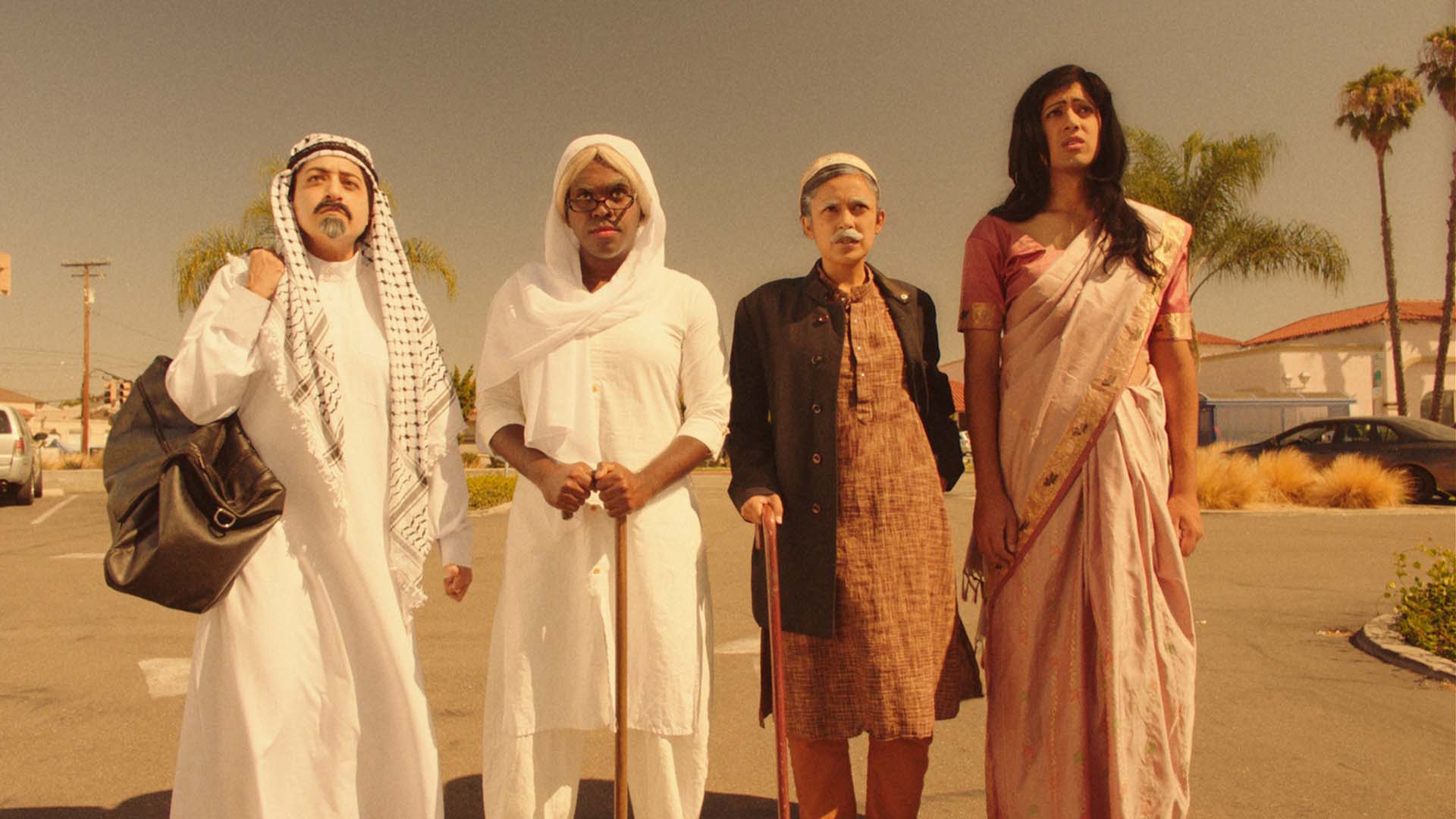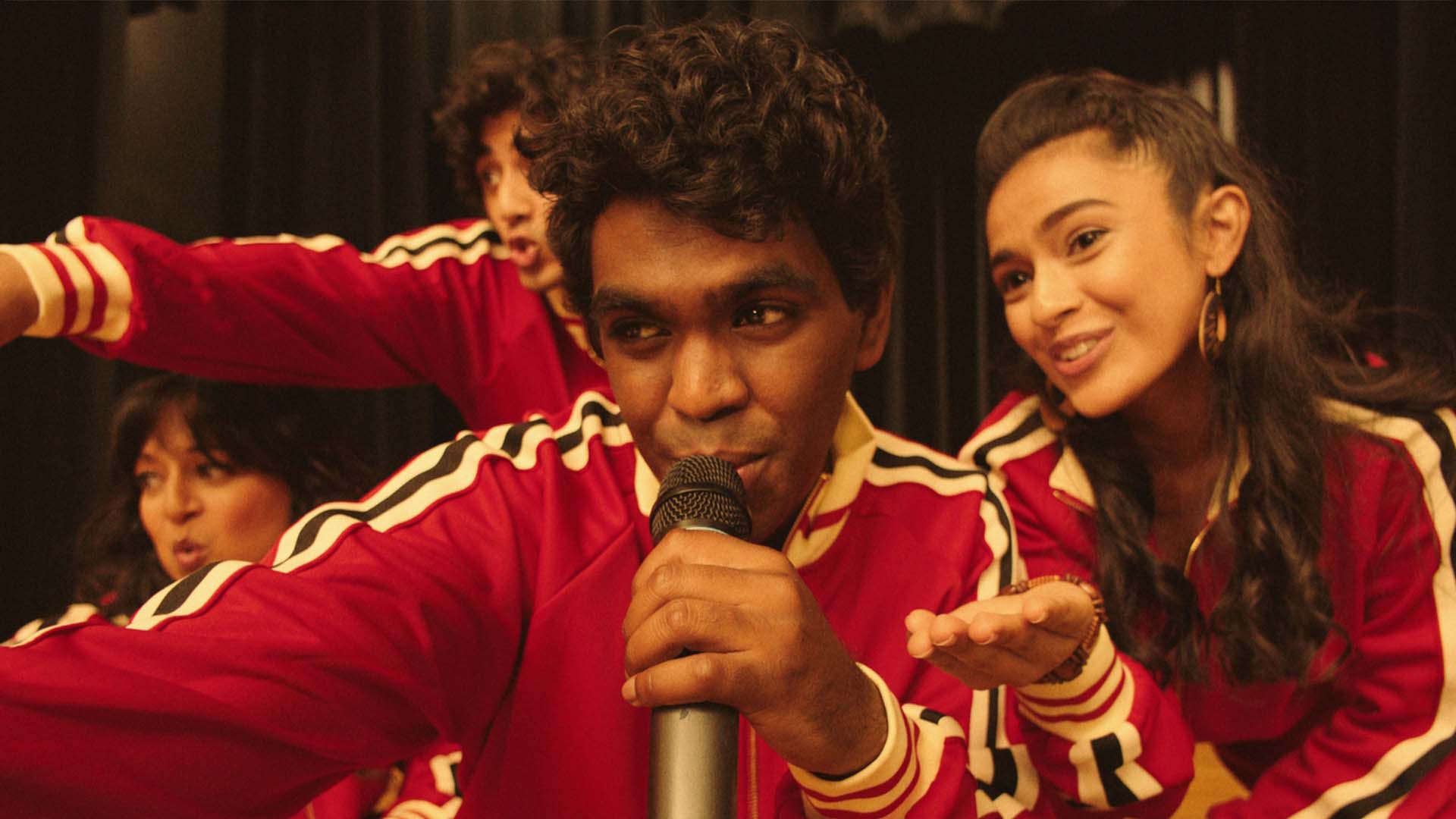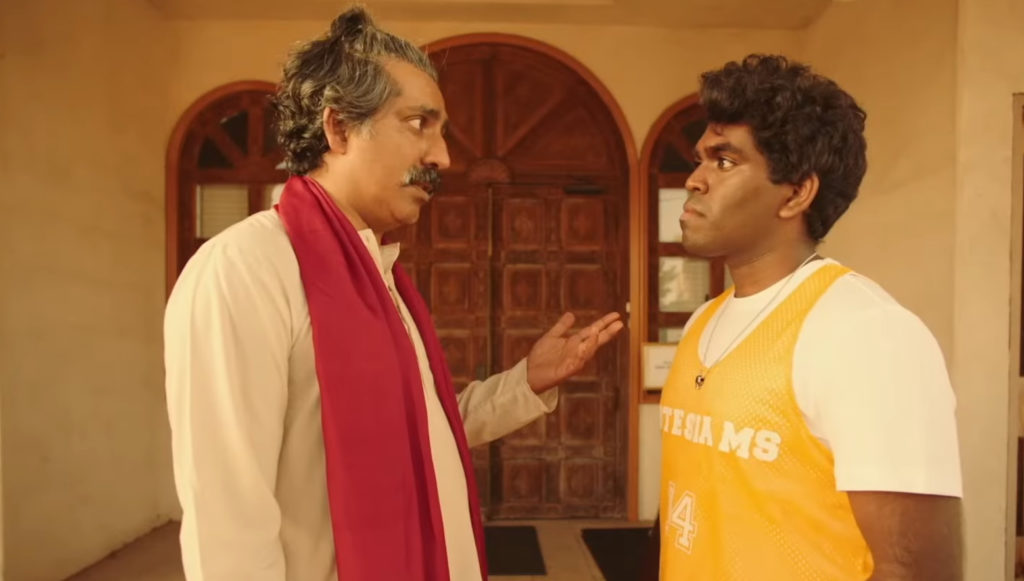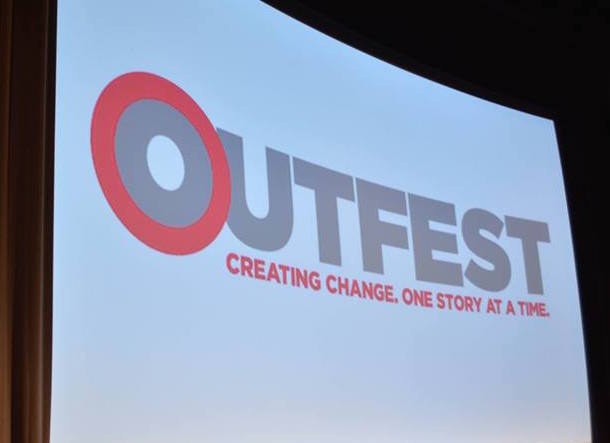Both RAVI KAPOOR and VENK POTULA have pursued their storytelling passions from both sides of the camera. Kapoor has acted in TV procedurals such as Crossing Jordan and 24 and in feature films including Ad Astra and Book Club. His behind-the-scenes endeavors began with a directing gig on Crossing Jordan, before he expanded into short filmmaking and features – with his feature debut as writer/director/producer, Miss India America, premiering in 2015. Potula, meanwhile, was discovered as a street performer by Nick Cannon, who cast him on Wild N’ Out, where he showcased his acting, musical, and improvisational skills. As a multi-hyphenate unable to fit in just one box, Potula started his own production company Khrisp Entertainment to create his own projects as a writer, actor, producer, and director. His short films include 2018’s Woke and 2020’s Zach and Mani Make a Mockumentary.
While Kapoor got to work prepping a second feature, and Potula searched for his company’s first, the two would soon come together for a film that took them back to their independent DIY roots. That film, FOUR SAMOSAS, is a low-budget comedy shot on location in Los Angeles’s Little India neighborhood. Potula stars as Vinny, an aspiring rapper who recruits a trio of first-time criminals (Sonal Shah, Sharmita Bhattacharya, and Nirvan Patnaik) to help him steal his ex-girlfriend’s family diamonds in order to disrupt her upcoming wedding. Karan Soni, Summer Bishil, and Sujata Day appear in supporting roles in the film, as does Kapoor himself.
Four Samosas premiered at the 2022 Tribeca Film Festival before going on to screen at the Raindance Film Festival and Newport Beach Film Festival, where it won the Audience Award for Best Narrative Feature. The film will be released in theaters and VOD on December 2, from IFC Films.
We spoke with writer/director/producer/actor Ravi Kapoor and producer/actor Venk Potula about their process in getting this new collaboration to the screen.
——
COLIN McCORMACK: I’m curious about how you two first connected. Was Four Somosas the first thing that brought you two together or had you known each other prior to this project getting off the ground?
RAVI KAPOOR: Yeah, we’d known each other a little bit prior. Venk had reached out to me, I think about six years ago, just for feedback on scripts and short films that he was making. So I was just kind of giving him my honest opinions, which were always very positive.
VENK POTULA: But very constructive as well, and very helpful.
RK: I hope so. And then Venk had written a podcast called Masala Jones, and both me and my wife Meera [Simhan] had acted in that. When I was writing Four Samosas I originally was writing it as a different concept. But then as I got to know Venk, I began to think, “Oh God, this guy would be brilliant as the lead in this film.” So I started writing it towards Venk in mind and then asked him if he’d come on board and act in it and produce it with me.
VP: Yeah, I definitely looked up to Ravi because of his track record as an actor, as a writer, and as a director with his last film, Miss India America. I knew about him, and so when I had the chance to talk to him I was really excited and inspired because there are so few people that I could look up to. With Ravi and his wife Meera — who’s also an incredible actress and plays Kamala, my mother in the film — to see them be professional actors and work in the industry for as long as they have, I felt really lucky to talk to them and get that experience of what is it like for other South Asian actors who are successful.
CM: Venk, since you’re a performer as well as a filmmaker, how do you know in what capacity you will best serve a given project, whether it’s something you just want to act in or something that you want to direct, but maybe not act in?
VP: I feel like it’s approaching the script while wearing different hats. I try not to just because I plan on directing this to also act. I don’t think about it like that necessarily, I always think if it wasn’t me in this particular moment, what would be best for this project? And I consider the fact that when you take on more responsibilities, it can be more of a challenge to act and direct. What is the support system that I need to execute this project so that the film is as good as it can be, and how involved do I need to be in order to make that the best film or TV show? Always my number one priority is what’s going make this the best for an audience as a consumer. And if I can be involved in multiple ways, sometimes I find that it does serve the project for me to be involved in multiple ways. A lot of times when I’ve written it as well, there’s a lot of my own voice in it that I’m still working through and finding. At times it does serve and then at times, it doesn’t.
CM: And Ravi, you started directing in the TV space on shows that you were also an actor on, where you’re jumping into something that is already in motion. When you started on short and feature filmmaking, did it feel like there were a lot of parallels between the TV work and the film work? Or was film its own beast that you had to learn?
RK: I think it’s very much its own beast. The commonality though is that you’ve got to figure out where you’re going to put the camera [laughs]. When you’re doing television, a lot of it is already set up for you and you’ve got this amazing cast already set up, the tone of the work is already set up, you have an incredible crew already in motion, and it’s usually a well-oiled machine. It becomes a little bit more of an exercise in figuring out how I visually just tell the story, which is great because it really helps you focus in on a few aspects and helps you really refine those skills. When you’re creating, writing, and directing something from the ground up, you are looking at big-picture stuff that you wouldn’t otherwise in television. And you get to find your own voice in it too. You get to figure out what story you want to tell and how you want to tell it.
CM: In terms of looking at the big picture of your career, after Miss India America came out, I’m sure there was pressure to go bigger with your next film. How did you juggle the outside or inside pressure to either stay in a specific lane or break out of expectations?
RK: That’s a great question. I did Miss India America six or seven years ago and after that, I was trying to get a bigger-budget movie off the ground and we were getting close and then we didn’t. And we were getting close, and then we didn’t. It was interesting, in the process I did feel like I was losing my voice. I was losing that lane as you talk about, which kind of drove me to go, I’ve got to go back and make something lo-fi again and really reclaim that voice and that initial instinct about the kind of stories that I wanted to tell and how I wanted to tell them. So in some ways, doing Four Samosas has been a little bit of a wake-up call to go really lock into the kind of thing that you want to do and try and stay in there this time.
CM: Conventional wisdom might say that the lower-budget project might be a harder sell. But if it’s something that resonates with you and you have more passion in the pitching of it, was it actually kind of easier to get off the ground than maybe you had anticipated?
RK: We got the picture off the ground by going to a lot of private equity places and there was a lot of pitching to be done in that regard. I think people can tell when you’re really connected to the piece of material that you have on hand. They can also tell when it’s very close to you as well. It definitely helps if you’re passionate about it. You can bullshit it to some degree and we do a lot of bullshitting in our lives in general and especially in this space, but most people can kind of smell it when you’re really into it or you’re not really into it.
VP: The great thing about doing something outside of the studio system is most people are in this not necessarily to make a bunch of money. So when you do have that piece that you’re connected to and you’re passionate about, stemming obviously from Ravi and then me trying to support any way that I can as well as being a filmmaker that wants to tell these kinds of stories, I think they connected with that. This idea that we’re doing something lo-fi and setting expectations about what kind of adventure this is going to become, was also helpful in the places that we were pitching to of why they resonated [with it].

CM: And Venk, from your side as a producer, had you been close to making other features before? What was the special sauce that made this one your debut feature as a producer?
VP: Yeah, I did have a feature. After writing and directing and producing so many shorts and our podcast Masala Jones, which was like producing a little mini TV series, I had felt that over the years I’d accumulated enough experience to go off and do the thing and make a feature. I felt it in my bones two years earlier, but I was just pretending. I was kind of bullshitting. And then two years later I was like, “No, I’m actually ready now.” I was going to start that journey and process of making an independent film and then COVID happened. And I thought, Well, I guess that’s that. I was not exactly sure how I could get this film off the ground and I actually ended up enrolling in graduate school at Chapman University in their MBA MFA program and thought I’d go back to school and learn and take on the loans and keep being involved.
Then, of course, Ravi sent me this script. And as surprised as I was that he asked me to play the main character, I was just as surprised if not more that he asked me to co-produce it with him. I’m not exactly sure what Ravi was thinking of in terms of being involved in that process, but I wasn’t sure if I was going to be able to service the project being a student. Then I think what happened naturally is we just had a back-and-forth that made it really easy to talk through things. One thing led to another and I think it was just pooling the relationships that we both had to ask and say, “Hey, would you guys be interested?” And it started to pick up the pace. Ultimately, people responded to Ravi’s script and his vision. It was one of those things where we put it out there and we were getting stuff back, and that’s what motivated us to keep going. Before, I was going to completely do it on my own, but by doing this with Ravi, I’m very lucky because Ravi’s credibility added a lot to why we were able to succeed. Me on my own starting out would’ve been much harder.
CM: How did the character of Vinny evolve once Venk officially signed on? Ravi, was the character already complete when you sent it to him?
RK: It was complete, but it changed obviously through the process and there were always rewrites happening throughout the whole thing. But in conversations that I was having with Venk, even before that first draft, just about life and about being an actor and surviving in this business and trying to find your passions and your voice and trying to stay in the game, definitely some of that stuff fed into my writing process when I was writing it with Venk in mind. I was stealing stuff from his personal [story].
VP: The truth comes out, Ravi! Now I realize when I read the script, I thought, “God, this is really familiar in terms of conversations I’ve had with Ravi. What’s going on here?” [Laughs]
RK: All that angst, I was being a vampire and just sucking it from you and putting it on the page.
VP: I think a part of me maybe even knew there was something to sharing these conversations with Ravi and it felt right to be that vulnerable. I definitely leaned into it. And of course, hearing Ravi’s advice throughout was really helpful. For me, there was a switch I had to make because I knew that Ravi had written the part with me in mind, but for me as an actor, I had to discover how Vinny was different from me, even though it was inspired. I started to find all these things that I don’t know if that’s Ravi or if it’s just the creative universe, but I started to see how this character isn’t me and how I can relate to the character. It started to become a process where I created him. Even the way he walks is different and his rhythms. It became much more about building this person and creating an identity separate from myself that made it easy for me to then slip in when we were shooting.
CM: What was the casting process like? It’s got to feel nice to offer this whole world of these South Asian characters of all personality types and different ages. I’m sure it was a wider array than the average roles that are coming a lot of South Asian actors’ ways.
RK: Yeah, that’s so gratifying to be able to create a project and then go out to these people that we knew and say, “Hey, we’ve got a fantastic role for you. Will you be a part of it?” We barely did any auditioning at all. I think there was only one character that we ever auditioned for. Everybody else, it was a straight offer because we just knew everybody that we wanted to work with and we knew that everyone could nail it. We’d seen their track records, we’d seen the work, we’d worked with them, and it was such a pleasure to be able to go, “Will you do this?” Everybody did nail it and was fantastic and they exceeded our expectations in terms of what their performances were like. We also knew what they would bring in terms of their commitment to the roles and their way of working as well because we were very lo-fi. We also were asking for people to trust in the style of the kind of film that we were shooting, which was a little bit heightened. It was a little bit up there and you couldn’t hide as well. We were always having these very wide angles right in your face, two inches away from your nose, so they had to trust and they all did and they were incredible for it.
VP: One thing that’s so empowering, as co-producers and as people bringing this film to light, is that we know our community, as opposed to it coming from some real top-down area. It wasn’t like that. It was just picking up the phone and being like, “Yo, you’d be great in this. Do you want to do it?” All the way down to even the smaller characters. Even Billu, the henchman [played by Havish Ravipati], was effectively a straight offer. It was such a community film in terms of everyone we brought together. It wasn’t about all of the hierarchies and whatnot you can get into when you’re dealing with another situation. That was such a joy, to bring everyone together and then make that movie with those people.
CM: And the film was always written to take place and be shot in Little India?
RK: Yeah. I’d always been fascinated with that area of Artesia and had been wanting to write a film set there for a long time. And I’d always wanted to do a heist movie as well. Then those two ideas came together. Artesia is a fascinating place. I love any Little India around the world; they’re like these little principalities that you can go to and it’s a way to visit the homeland without having to get on an airplane. Artesia, specifically, has got a very particular vibe about it and I wanted to try and grab ahold of that vibe and elevate it a little bit more as well.
CM: You mentioned the style is a little heightened, a little elevated. What were the visual inspirations in that sense?
RK: I would say there are quite a few. Delicatessen is one of my touchstone films, which I love. It’s a bit of a clown film and it’s very colorful and the colors are very saturated. I love Buster Keaton and that slapstick element too. Nothing makes me giggle more than a good pratfall. And there’s definitely a Wes Anderson kind of thing that you can’t help but love. Obviously, in his later movies he’s got a massive art direction budget to work with, but as you look at his earlier stuff as well, you could still see glimmers of that incredible stylistic point-of-view. And then of course, I think a lot of people touch into the Napoleon Dynamite feel of it as well with the deadpan quality. It was all of that stuff that I like filtered to whatever this movie was demanding that it should be.
CM: Are you an extensive storyboarder?
RK: I pretty much know every kind of shot that I would like to get, if possible. Obviously, you get on set and things happen and you get inspired or you are limited by certain events. But I will map out every single scene before I go in to shoot just so that I have something to work from.
VP: Also, something that was a decision early on was understanding the right world in terms of a budget to fit the story. We were never trying to make a project that was going to be a huge blockbuster movie. In some ways it felt like the script — and Ravi, correct me if I’m wrong — didn’t want to become that. So the limitations were very freeing. To explore within the restrictions and [asking], “What can we do?” That’s another reason why the cast was all able to lean into that style, ’cause we knew at the end of the day this is very specific and it’s not trying to be something that it isn’t. That was either lucky or intentional, but it worked in our favor.
RK: Intentional! [Laughs] It’s all intentional, all of it. Every single thing!

CM: The music was also really a unique, intentional choice, from the diegetic rap to the score. What were your inspirations on the music side of things?
RK: We had a great composer, Sagar Desai, who is originally from Chicago but is now based in India. He has a real gamut of understanding of different musical styles. He’d also scored one of my short films and I just knew he gets the quirky kind of quality of these kinds of films and he himself is a little eccentric, so he’s able to lean into that quality. So he brought in western classical music and Indian classical music and then of course we have the modern western indie song score stuff. And then a little bit of rap as well that we have in the movie because Venk plays a wannabe rapper. It was a really eclectic kind of thing. Even my son, who’s an 18-year-old kid, did some of the music for the film as well. This is how much of a family and close community affair this was.
CM: Did you guys write the raps together? Were they in the script? How did that come about?
VP: Ravi wrote the first rap that Vinny does in the film and we co-wrote the end song. Ravi also wrote the lyrics to the love song that Vinny does. In terms of the song that takes us out of the movie, that was a creative collaboration between the two of us. We wrote it and then I performed it and it was so fun. We did it in less than 12 hours, the whole thing. And it was so, so fun to be able to write something and perform it right there in the moment within that short period of time. It’s so different from other forms of performing with theater, film, and long-term projects. This was so in and out and incredibly satisfying for me. I was very inspired by it.
CM: You also got to shoot some fake Bollywood movie scenes and some musical numbers. What was that like to — in a movie that already has some heightened elements — be able to go even further outside of that into completely different genres?
RK: Oh, it was so much fun. There’s this kind of Bollywood pastiche thing and the fantasy thing, and I just couldn’t resist doing it in this film. We had a character that loves Bollywood, so we had to create a scene where we see him get that Bollywood movie [moment]. And I think what it does as well is it kind of locks us into that character’s state of being and the fantasy world that he lives in his own mind too. So it’s got a real emotional and character-defining element to it too. But I mean, it was fun. We also had a Bollywood [movie-within-the-movie] scene, which if you watch the whole movie to the very end of the credits, we have this fantasy Bollywood movie that’s built-in. Originally we wanted to use a famous Bollywood movie from the ’80s, but we just couldn’t get the rights and there was no way we were ever gonna be able to afford them. So we were like, Let’s just make our own Bollywood film. And we shot this whole Bollywood scene and it ended up not being in the main part of the film as much as we expected, but we found a way to put it in at the end credits. So that was a huge amount of fun too.
CM: That’s the state of movie rights, that it’s cheaper to make your own [fake] movie than it is to license somebody else’s?
VP: That’s so true.
CM: How long was the shooting schedule?
VP: We shot for 16 days, separated by weekends.
CM: Compared to the expectations going in, what was the reality of working within the COVID protocols?
RK: It was definitely a steeper financial hill than we thought it was going to be. It ended up sucking a big portion of the budget, which is difficult. I think we were a little bit surprised by that. Because we were following all the protocols.
VP: I just remember early on [in 2020] we were thinking, Oh, by the time summer comes, things will be better. And it just never really changed [laughs]. So it was like the movie we shot in August 2021 could have been [made in] August 2020. Safety is always first and foremost. But obviously, the situation is the situation.
RK: And it’s interesting as well though, in some ways it creatively dictated some things that we went for, which were really positive in the end. We have a lot of scenes where instead of going into Vinny’s house ever, everything takes place in an open garage, which I think is a fascinating metaphor in terms of the things that we store and leave behind. And it’s a place where we dream as well. We rehearse and we make things in garages. That became a really cool thing that I was happy with and that idea came out of the COVID situation. Also, there was an earlier draft of the script where we were going to have this massive ending where there was a whole talent show with hundreds of people there. And it became very clear that we were never going to be able to do that with COVID going on because we couldn’t afford to test everybody and it was just too dangerous. So we decided to make it an audition with a big massive empty hall, which is actually perfect for this kind of film and the kind of visuals that we were reaching for as well. So I think COVID actually gave us some things too on a creative level.
VP: There’s a shot where Vinny and the crew do a whole song and then it cuts to the reaction. And in some ways, the song has the weight as if they’re doing it for 4,000 people and you cut to the reverse and it’s just the same four people that are not reacting and it’s a huge empty hall. It’s just bringing it back down and it always gets a laugh ’cause there’s something funny about that emptiness of those four people there.
CM: The film looks so meticulously styled, but I’m wondering what happy accidents may have come about during production. Was there anything, problem-solving-wise, that you had to pivot and change that made it into the film?
RK: The first day of shooting was supposed to be in a convenience store where Venk’s character was selling rice cookers and he had this whole monologue about different rice cookers. And I think the Friday before we started shooting on a Monday, the location fell out and so we were running down to Artesia, trying to find somewhere else. We managed to find a sari store where they were happy to let us film. And I have to say, the community down there was just absolutely incredible. Once we locked our location in that Saturday and Sunday, I wrote a whole new monologue about Venk’s character selling saris instead of selling rice cookers. I gave it to him on Sunday night, and by Monday morning, he’d nailed it. He’d learned this whole monologue, which just a little bit of it ended up in the film. But again, I think that was a happy accident. And I think the idea of this rapper working in a sari store was a great little dichotomy. That was a kind of fun pivot.
VP: And I should tell you, Ravi didn’t make the pressure any less when he told me, “My idea to open the film is it’s going to be a closeup of you that never cuts throughout the entire monologue. By the way, you have to memorize it in six hours.” [Laughs] I was like, “Oh God, thanks for that encouragement.” No, obviously it worked out great and it was really funny to explore that. That’s just rolling with the punches. That’s every movie, right? We all have happy accidents and things that happen that we just work with. What’s perfect about it is that it’s sometimes not going to be perfect.
CM: Have you been able to screen the film in Artesia yet?
RK: No, but when the film opens on December 2, it is going to be at the Cerritos 16. So we’re planning to do a little sneak preview the day before the actual opening down there and try and get all of that community over. We can celebrate the film together and say thank you to them as well because they were absolutely incredible and generous.
__
A big thanks to Ravi and Venk for talking to us about FOUR SAMOSAS. Learn more about the film at foursamosas.movie or follow the film on Instagram.
This interview has been edited for clarity.
If you’re an independent filmmaker or know of an independent film-related topic we should write about, email blogadmin@sagindie.org for consideration.




